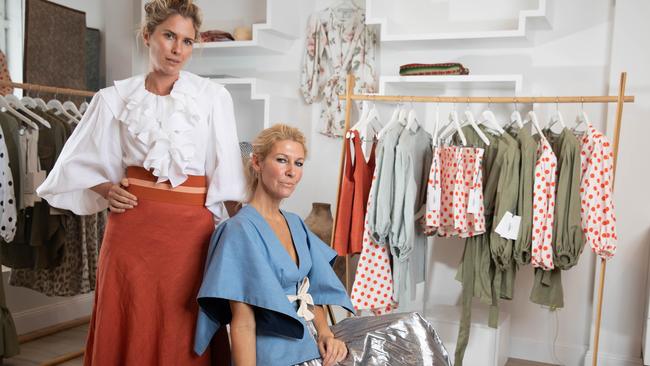Friends with passion for fashion and social conscience
Best friends Sarah-Jane Clarke and Heidi Middleton told The Australian they are humbled and grateful at their honour.
In the early 2000s, the brand on everyone’s lips — and legs — was Sass & Bide. When Brisbane best friends Sarah-Jane Clarke and Heidi Middleton started selling customised denim on London’s Portobello Road in 1999 they had “a dream of creating a global fashion brand”, said Clarke.
That dream came true.
Breaking through with their scandalously low-rise East Village jeans, the label would become known globally for its unique aesthetic that combined femininity and decorative embellishment with a tough urban appeal.
They took the brand to the catwalks of London and New York, where they also opened a store, and were stocked in some of the world’s best retailers, including Harvey Nichols, Selfridges and Barneys. At its peak of success, in 2013, Middleton, Clarke and their investors finalised a deal with department store Myer, which bought the brand for a reported $72 million, an unprecedented deal in Australian fashion history.
Middleton and Clarke told The Australian that they were humbled and grateful at this recognition.
“It is even more humbling to reflect on the impact we have had while living out our dream and, most importantly, the opportunity it has given us to empower others,” Clarke said.
Middleton added: “I have been blessed to pursue a working career that I have loved, so to be acknowledged for our contribution feels very special — an unexpected layer to a livelihood that has been a joy.”
During their years at the label, Middleton and Clarke began associations with the children’s charities Make-a-Wish Foundation and Barnados, raising hundreds of thousands of dollars for each with the sale of dedicated products.
“The interest in children’s welfare and social justice has always occupied a big part of what I believe in,” Middleton said.
“It felt natural and essential to weave it through my working life.”
The brand was one of the early partners, from 2012, of the UN-backed Ethical Fashion Initiative, in this instance working with women artisans in Kenya to create bags using traditional skills for a contemporary audience.
“We went to Africa and met the ladies making the bags. And we learnt about how crucial it is for women to be empowered in those communities, because they pass the wealth down to educate their children,” Clarke said.
Both women took a personal hiatus after leaving the company in 2014 and in the past six months have launched individual projects, Sarah-Jane Clark Made for Travel and Middleton’s Artclub. Both put a focus on sustainability, with small runs and local manufacturing. “The fashion industry is one of the largest contributors to environmental pollution. While the threat is palpable and very real, there is still time to make dynamic changes to the way the industry operates,” Middleton said.




To join the conversation, please log in. Don't have an account? Register
Join the conversation, you are commenting as Logout